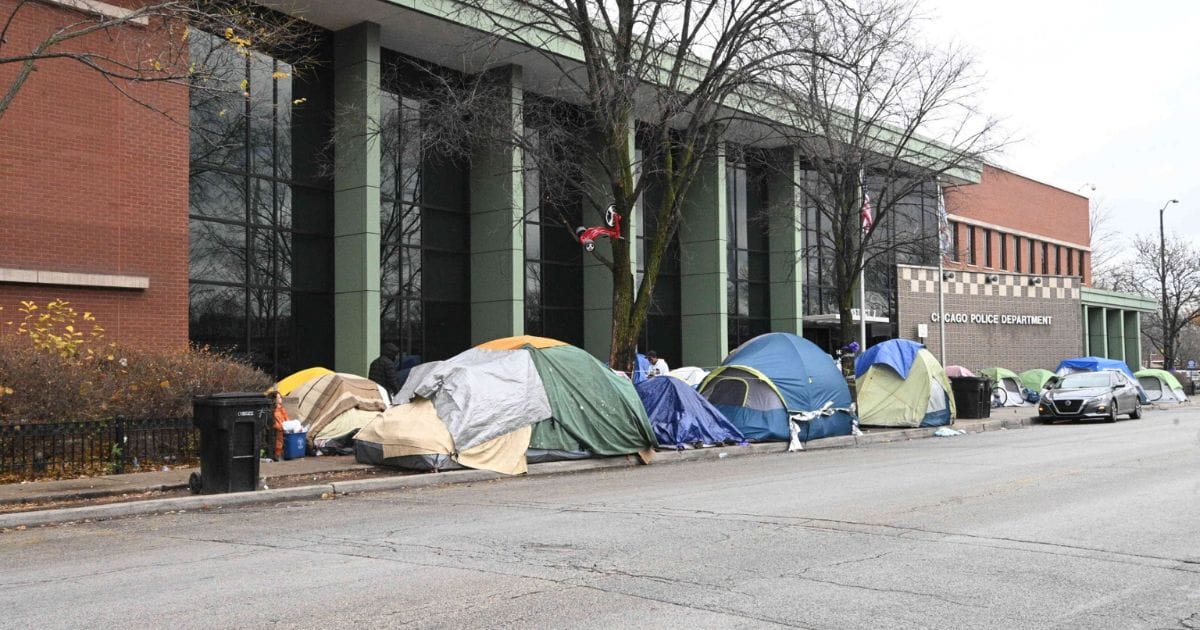Migrants sleeping in tents outside a West Englewood Police Station 7th district. (Photo by Marcus Robinson)
In a comprehensive effort to address the ongoing humanitarian crisis posed by the arrival of over 24,000 asylum seekers from the U.S. Southern Border, both the City of Chicago and the State of Illinois are taking significant steps to streamline services, enhance resettlement, and provide support for those in need. This combined approach reflects a commitment to compassionate and effective responses at both the local and state levels.
State of Illinois Takes Bold Action
Governor JB Pritzker has announced a groundbreaking plan that involves an additional $160 million investment through the Illinois Department of Human Services (IDHS) to tackle the challenges presented by the surge in asylum seekers. A thorough analysis, incorporating data and frontline input, identified critical “bottlenecks” in the system, hindering the smooth transition of arrivals.
The State’s plan revolves around a data-driven strategy to address these bottlenecks at various stages of the asylum seeker response. One of the key components is the allocation of $30 million to establish a large intake center that will centrally welcome and coordinate new arrivals. This approach aims to reduce the number of new arrivals requiring shelter by 10%, emphasizing better support for those seeking alternative arrangements outside the city shelter system.
Collaborating with the City of Chicago, the State has committed funds to deploy a team from New Life Centers of Chicagoland to assist new arrivals at the bus landing zone, providing support for those choosing alternatives outside the city shelters.
Addressing the shelter challenges, $65 million will be dedicated to launching a winterized soft shelter site in Chicago, accommodating up to 2,000 people for six months. This initiative prioritizes families and individuals with disabilities who are currently sleeping outdoors, ensuring a safe and warm place during the winter months.
Furthermore, an additional $65 million will be allocated to expand wraparound services at City shelters, encompassing case management, legal services, work permit processing, and workforce development support. The State remains committed to providing rental assistance to facilitate the transition from shelters to independent living.
Governor Pritzker stressed that this initiative builds upon the $478 million in state funding committed over FY 2023 and 2024 for the asylum seeker response. These funds cover direct support to the City of Chicago and other municipalities, as well as substantial state funding for shelter, food, medical care, rental assistance, and wraparound casework and services.
To fast-track the transition to self-sufficiency, the State will lead efforts to move thousands of individuals through the federal Temporary Protected Status (TPS) and Employment Authorization Document (EAD) processes. Large-scale workshops, co-located with federal assistance and job search resources, are planned to facilitate the application process. The State aims to assist approximately 11,000 eligible asylum seekers with TPS/EAD by February 2024.
Governor Pritzker emphasized the need for federal intervention, acknowledging the strain on state resources and urging Congress to address the humanitarian crisis. Despite these challenges, the State of Illinois remains committed to providing comprehensive support to asylum seekers, ensuring their safety, dignity, and access to necessary resources.
City of Chicago Accelerates Resettlement Efforts
In tandem with the State’s initiatives, the City of Chicago is unveiling the next phase of the New Arrivals Mission to accelerate resettlement efforts for new arrivals. This multi-pronged approach builds upon the work that the City has undertaken over the past year.
Firstly, in partnership with the State of Illinois, the City is increasing personnel at the landing zone to help new arrivals reunite with their friends, family, or verified sponsors. Recognizing that Chicago is not always the final destination for these arrivals, this strategy aims to save space in the shelter system for those who plan to stay in the city.
Secondly, the City is cracking down on “rogue buses” that pose logistical obstacles for intake and endanger the lives of new arrivals. New regulatory tools will allow the City to cite and fine bus companies that disregard curfews, landing zone locations, and loading/unloading protocols.
Finally, the City will implement a limited stay policy alongside additional supports from IDHS. For individuals and families currently in City shelters, 60-day exit notices will be issued in waves based on their arrival date to shelter, expediting the transition process.
Mayor Brandon Johnson highlighted the three anchors of this new phase: creating pathways to resettlement, community integration and reunification, and building public infrastructure for the public good. The Mayor emphasized treating new neighbors with compassion and recognizing their potential contributions to the community.
The City of Chicago has successfully resettled or assisted outmigration for more than 10,000 new arrivals as part of the New Arrivals Mission. Working with partners at Catholic Charities and the State of Illinois, the City has helped resettle more than 7,000 individuals, including more than 2,700 households, into long-term housing. Permanent or long-term housing is a crucial step on the path to self-sufficiency and resettlement.
In addition to providing shelter, the City has taken measures to employ Chicago workers and businesses in the New Arrivals Mission. Renegotiating the contract with Favorite Staffing has resulted in a majority of staffing shifting to local/regional staff, with cost-savings of more than $1.5 million per week.
As part of the comprehensive approach, the City is partnering with IDHS to provide additional supports to those in shelter, including short-term housing resettlement resources via the Asylum Seeker Emergency Rental Assistance Program (ASERAP). To maximize resources, IDHS is adjusting ASERAP to provide three months of rental assistance rather than six months.
While both the City of Chicago and the State of Illinois acknowledge the challenges of the humanitarian crisis, their unified efforts underscore a commitment to providing immediate support, streamlining processes, and empowering asylum seekers on their journey to self-sufficiency. The collaboration between local and state agencies exemplifies the power of collective action in the face of complex challenges.






